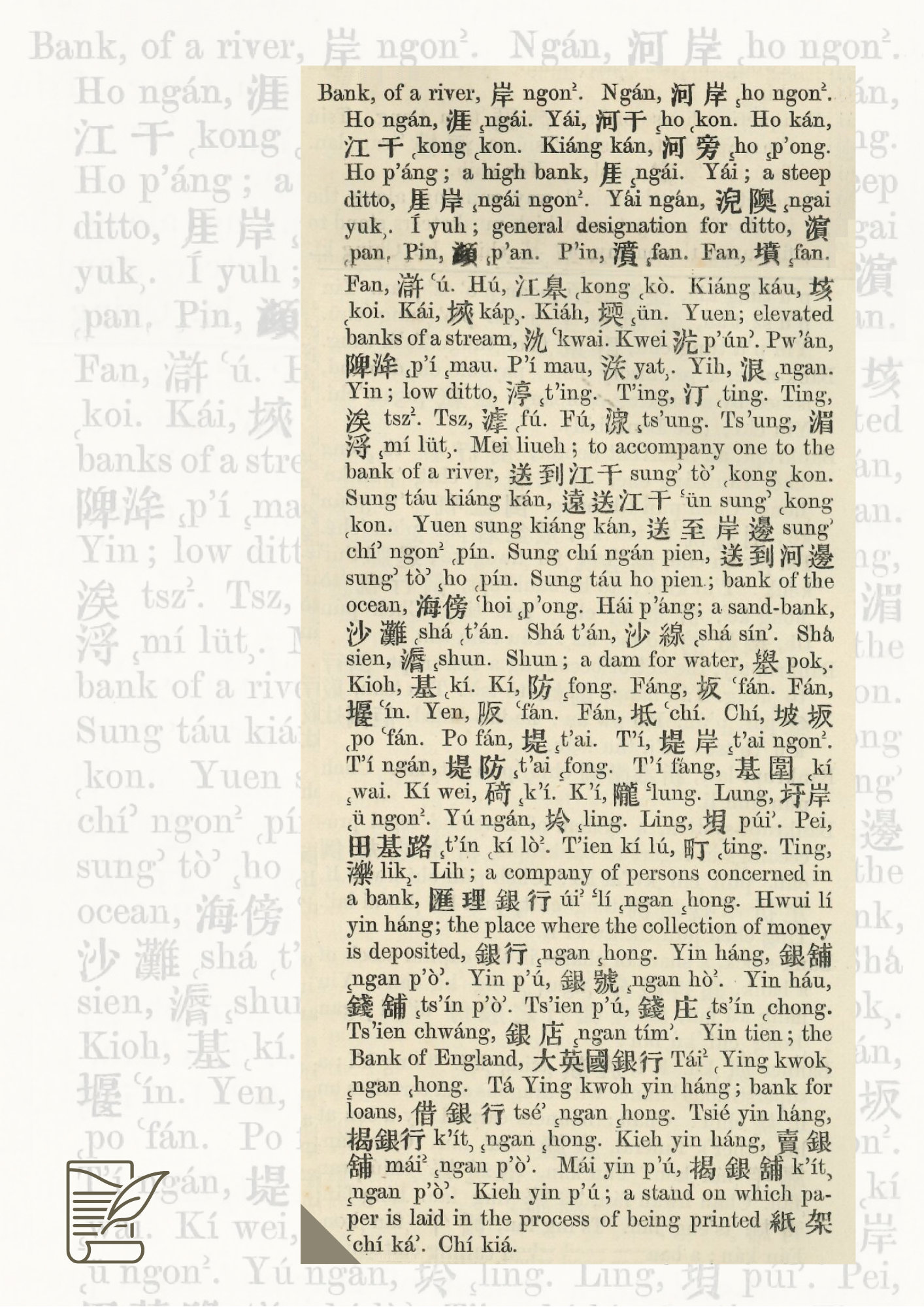|
||
|
||
|
| |||
| 30 NOV 2020 | ISSUE 8 | ||
|
| |||
| 3. Collection Spotlight | |
|
An Early English-Chinese Dictionary Printed in Hong Kong |
|
|
The first attempt was Robert Morrison's Dictionary of the Chinese Language, in Three Parts (1815-23), the world's first Chinese-English, English-Chinese dictionary. Other important works included Samuel Wells Williams's An English and Chinese Vocabulary in Court Dialect (1844), Walter Henry Medhurst's English and Chinese Dictionary (1847-1848), and Wilhelm Lobscheid's English and Chinese Dictionary with the Punti and Mandarin Pronunciation (1866-1869). These dictionaries were important for overseas learners and played a vital role in the compilation and publication of bilingual dictionaries in the modern age. Among them, Lobscheid's English and Chinese Dictionary was the most comprehensive version of its kind printed in Hong Kong in the 19th century. It was also the most important dictionary collected by the Library in the past decade.
This is a four-volume dictionary compiled by Wilhelm Lobscheid, a German missionary and printer who served in Hong Kong and Guangdong Province for over 20 years. Lobscheid joined the Rhenish Mission Gesellschaft (RMG) in 1844, where he also completed his studies in theology and medicine. After receiving his doctorate degree, Lobscheid was sent to Hong Kong for the missionary work in 1848. He learned Chinese in Hong Kong and began to work with Karl Gutzlaff, a mission pioneer and linguist who was the first to translate "Christian" into Chinese "基督徒". Just as Gutzlaff, Lobscheid believed in the importance of printing in his efforts to spread the gospel. His works included editing Karl Gutzlaff's translation of the Bible, Chinese grammars and booklets on a variety of topics, as well as this dictionary. He resigned from the Rhenish Mission and lived in London from 1851-52. In 1852, he became the first medical agent of the Chinese Evangelisation Society (CES) and was based in Hong Kong as a missionary. He worked for the Hong Kong government as the first Inspector of Schools after he resigned from CES in 1857. In 1870, he left Hong Kong for the United States where he spent the rest of his life. Lobscheid's English and Chinese Dictionary was the first comprehensive English-Chinese dictionary published in Hong Kong with Cantonese (he called it punti, meaning local language) and Mandarin pronunciation. It collected about 50,000 English terms and their equivalent translation in 600,000 Chinese characters. The Chinese text "子曰辭達而已矣 "(Confucius says, "language should be intelligible and nothing more") on the book cover of each volume tells Lobscheid's attitude to language and translation.
Although the dictionary covered a wide range of English vocabulary, had plenty of examples and better translation, it had limited circulation in China due to its high price of US$30. The dictionary was re-edited and published in Japan in the later years. As a result, it had a great impact on learning the English language and the compilation of English-Japanese dictionaries in modern Japan. The Japanese translation of the English words including "bank" (銀行), "insurance" (保險), "left wing" (左翼), "right wing" (右翼), "sovereignty" (主權), "ballot" (投票), "traffic" (交通), etc. originated from the Chinese terms in Lobscheid's English and Chinese Dictionary (周佳榮, 2012). In fact, his dictionary is notable for its creation of new Chinese terms that are commonly used today.  .png) .png) (Click an image to view at full size.) The Library is pleased to have loaned this valuable English-Chinese dictionary from its Special Collections for an exhibition "Between the Lines – Legends of Hong Kong Printing" held at Hong Kong Heritage Museum from 7 October 2019 to 22 February 2020. The exhibition unpacked more than a hundred years of local printmaking history in Hong Kong, from historical lithography to letterpress printing introduced by western missionaries. References: |
|
|
Past Issue
| |
|
|
|
|
|





.png)
.png)